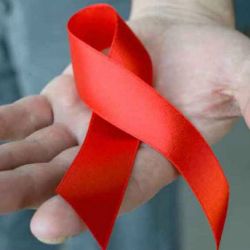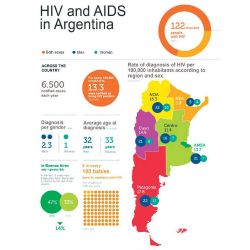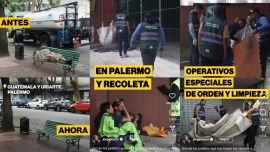Another year, another International AIDS Day. Most of us barely battered an eyelid at the December 1 commemoration: a day of remembrance, reflection and action. And even more of us, myself included, forgot completely.
Yet worldwide there are nearly 37 million people living with HIV/AIDS. Of those, an estimated 122,000 live in Argentina. The national government and HIV/ AIDS groups claim around 30 percent of all positive people in the country do not even know their status. While there has been significant progress in containing the spread of HIV, especially among women, the panorama seems much the same as it did five or 10 years ago.
On a recent trip to Chile, I met with an old friend who told me how a mutual acquaintance of ours had contracted HIV. And that at one point along this man’s dark path toward treatment, of fears and stigma, he had chosen to stop taking his medication and die.
At just 40-years-old, this young professional had access to quality healthcare and psychological support. So what went wrong? What is going wrong in the battle against the HIV/AIDS epidemic?
ONE KEY LAW
Despite losing 1,500 lives to AIDS-related diseases each year, Argentina has had some success in tackling the problem, in part because of the implications of the right to universal healthcare as enshrined in its Constitution.
Here, anti-retroviral medication is freely available to Argentines and foreigners alike. From 1990 to late 2016, almost 140,000 people began treatment for HIV/AIDS in Argentina, Health Ministry statistics indicate. In 2017 alone, 6,500 began treatment — a positive sign against the estimated 5,500 new infections each year.
But “statistics are statistics,” says Dr. Fabio Nuñez from the Health Ministry’s AIDS and STD Directorate. And the law can only go so far if legislation is not being properly implemented.
In a country where many conservative private and religious schools are known to ignore the national curriculum (sexual education and national history, specifically), he points to one law in particular: “At some point as a society we have to be able to question the State over its inaction regarding the Integral Sexual Education Law (2006). We need to control what happens in schools and classrooms. Young people have to learn what it means to have healthy sexual experiences,” he said in an interview with the Times.
ON COMPLACENCY
Within the HIV/AIDS epidemic, which still disproportionately affects men who have sex with men (MSM), there lies a message of caution about complacency. In 2010, Argentina became the first country in Latin America to pass same-sex marriage legislation. But in the capital, where same-sex couples (in some neighbourhoods) can often be seen holding hands in the streets, a young gay man was recently beaten to a pulp at a McDonald’s store in Recoleta.
During a presentation in Buenos Aires on Wednesday at the local office of the United Nations, representatives from government offices joined support networks and NGOs to address best practices in tackling the HIV/AIDS epidemic. Particular emphasis was put on addressing the long-term struggle for social and cultural change.
“We have to return to the streets (like we did in the early years of the HIV/AIDS outbreak) and put key social and cultural questions back into public debate”, Dr. Nuñez adds.
“If young, well-informed, middle-class men in the capital are ending up in hospitals and dying, they’re not just telling us that they’re sick of taking their medication, they’re saying: ‘We’re tired of putting on a happy face, we’re tired of society discriminating against us.’”
Dr. Nuñez, Coordinator of the Human Rights and Civil Society area of the Directorate, points to another issue among demographics where the HIV/AIDS message has traditionally been heard the strongest: “In some spaces we’re seeing the debate centre around the use of PREP (Pre-exposure prophylaxis, a drug aimed at high-exposure communities to lower chances of infection).
“Fortunately, the Directorate’s position is to promote combined forms of prevention. Otherwise we would have serious problems, medicating everybody so they don’t get HIV and forgetting about syphilis, about chlamydia, about gonorrhoea, and so on. “Today in Argentina, we have a serious problem with syphilis.”
POVERTY AND DISADVANTAGE
Marcela Alsina sees the issue from a different perspective. She is the Coordinator of the Buenos Aires Provincial Network of People living with HIV and the Regional Coordinator of the Latin American and Caribbean Movement of Positive Women. She has been HIV positive for nearly 30 years and holds vivid memories of the times she and her friends would chain themselves to government offices in what was a true fight for their lives.
“In distant corners of the country there are HIV positive people who don’t have food to eat, where powered milk isn’t available in hospitals. Some of us in Greater Buenos Aires, for instance, have to take two buses to get to a hospital where we might end up spending the night just to get attended to,” she says.
“We need clear plans and articulation (between relevant parties). Enough with statements and declarations! Let us be participants of this fight because it seems we’re only participants when we die.”
Around half of HIV positive people in Argentina live in Greater Buenos Aires. Marcela and her colleagues’ work with women in areas like Merlo has gained her the praise and respect of Health Ministry officials, including the head of the Directorate of AIDS and STIs Dr Sergio Maulen, who points to smaller networks and ground level programmes as a path for real action.
“You can see the impact of the work of Marcela’s group of the RAJAP (Network of Positive Adolescents and Youths in Argentina), the latter of which was able to encourage the diagnosis of over 300 new cases last year,” he says.
“Social issues continue to be the key factor. We live in a chauvinistic society, a totally negative society for the communities with the greatest exposure to HIV,” he told the Times.
For his part, Dr. Carlos Passarelli, head of UNAIDS for Argentina, Chile, Paraguay and Uruguay, pointed to some good news, saying “more people than ever before are being treated. In general, medication is available in all cases where it’s required.”
All speakers at the UN event on Wednesday remembered, solemnly, the ex partners and dozens of friends who have died as a result of HIV/AIDS in the 30 years since its outbreak. They are part of the almost 40 million people who have lost their lives to the disease worldwide.
If one thing characterises those government services, NGOs and support networks that participate in this battle it is consensus: not only must poverty and discrimination be addressed to end the HIV/AIDS epidemic, it is also unacceptable that 1,500 lives every year in Argentina are lost to a virus that can be treated so effectively and quickly.



























Comments